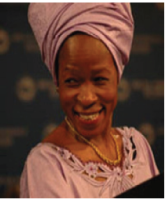Alumni of the Month

Anna Kajumulo TIBAIJUKA
YEAR OF MATRICULATION: 1972
EDUCATION:
Anna Kajumulo TIBAIJUKA is Our June 2020 Alumna,
and her great stories begin here!
The University of Dar es Salaam’s ‘Alumna of the Month’ for June 2020 is Anna Tibaijuka (née Kajumulo). Anna was born to a couple of rural farmers in the village of Kagabiro in what is today Muleba district [in Bukoba], on the 12th of October, 1950. She was born a fifth of eleven children to the now-late hard-working and religious parents Mr. Alexander and Mrs. Aulelia Kajumulo. At the age of eight, she was sent to primary school at Kaigara (1958 -1961) and then to Kashozi girls middle school (1962 -1965), from where she qualified for secondary education at Rugambwa Girls (1966-1969) and Marian College now Kilakala Girls Secondary School?in Morogoro (1970-1971). Backed by exemplary performance, she gained admission to the University of Dar es Salaam for a degree programme at the Faculty of Agriculture (1972-1975). She was retained and appointed tutorial assistant and later assistant lecturer in the Department of Economics and subsequently left for Sweden where she undertook a doctoral study programme at the Swedish University of Agricultural Sciences in Uppsala. She was awarded a doctor of science (DSc) in agro-economics. Anna has taught, researched, and published at the University of Dar es Salaam on varying themes of her specialization: on agriculture and rural development, on farming systems, on food policy, on agricultural marketing and trade, as well as on environmental economics, among others. She grew up steadily through the academic ranks from the lowest to the highest. Her numerous publications include Factors influencing the cultivation of firewood trees on peasant farms: A survey on smallholder banana-coffee farms, Kagera Region, Tanzania (Uppsala: Swedish University of Agricultural Sciences, 1985); Poverty and social exclusion in Tanzania (with F. Kaijage; Geneva: International Labour Office, 1996); The social services crisis of the 1990s: Strategies for sustainable systems in Tanzania (as editor; London: Routledge, 1998); and Building prosperity: Housing and economic development (London: Taylor & Francis, 2009).
But there are more things to say about Anna Tibaijuka, which obviously came by way of hard work and commitment as a research-based scientist and consultant. She first got an appointment with the United Nations in 1998 at the United Nations Conference on Trade and Development (UNCTAD) in Geneva as Director and Special Coordinator for the least-developed, land-locked and island developing countries. At that point in time, she became the highest-ranking African woman in the UN system. She was in charge of capacity-building in trade negotiations in the World Trade Organization (WTO), and, for the first time ever, she managed to assist the least-developed countries (LDCs) to forge a coherent and united negotiating position for their special trade interests. In July 2000 she was appointed by Secretary-General Kofi Annan as Assistant Secretary-General and Executive Director of the then United Nations Centre for Human Settlements (UNCHS), a UN agency dedicated to the built-up environment and urban development, headquartered in Nairobi, Kenya. She is reckoned to have raised world awareness of the ever-increasing challenge of the chaotic, if haphazard, urbanization processes. She is also remembered to have focused the Centre’s strategic vision and mission and raised its profile to a point of being upgraded, in December 2001, into a full-fledged United Nations Programme on Human Settlements (UN-HABITAT). She was in turn elected by the General Assembly as the first Executive Director of the new UN-HABITAT programme at the level of Under-Secretary-General (in December 2002).
In early 2004, Professor Tibaijuka was appointed to a seventeen-member Commission for Africa established by British Prime Minister Tony Blair, whose work finally resulted in a cancellation of multilateral debts for several African countries, including Tanzania, by the G-8 summit in 2005. In July 2005, following massive evictions of the urban poor in city clean-ups by government authorities, the UN Secretary-General appointed Tibaijuka as his ‘Special Envoy on Human Settlements Issues in Zimbabwe’.
With effect from April 2006, Dr. Tibaijuka was designated by the Secretary-General as Officer-in-Charge of the United Nations Office at Nairobi (UNON) – then the only UN headquarters in Africa and the developing world. She also got appointed as a member to the WHO Commission on the Social Determinants of Health and also as a member to the Advisory Board of a multi-donor-sponsored Commission on the Legal Empowerment of the Poor, a Commission that was co-chaired by Ms. Madeleine Albright (former US Secretary of State) and Chilean economist Hernando de Soto.
Anna Tibaijuka has been active, bold, and enterprising on other fronts as well. For instance, in 1994 she founded a Tanzanian National Women’s Council, BAWATA, an independent non-party-affiliated organization to fight for women’s economic and social rights - a journey that oftentimes landed her into a collision course with authorities. In 1996 she founded a Barbro Johannson Girls’ Education Trust (‘Joha Trust’) for advocating and operating quality education for girls in Tanzania and Africa. It operates a model secondary school for poor, mostly orphaned girls.
Upon return from service with the UN system abroad, Anna Tibaijuka ran for and gained a parliamentary seat and she has since served as a member of parliament, as a minister for lands, housing, and human settlement development and in other capacities.

